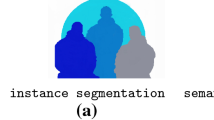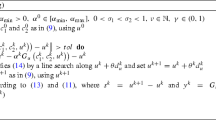Abstract
Image segmentation is one of the most fundamental steps of image analysis. Almost all image segmentation algorithms have their parameters that need to be optimally set for a good segmentation. The problem of automatically setting algorithm parameters on a per image basis has been largely ignored in the vision community. In this paper we present a novel solution to this problem based on classification complexity and image edge analysis.
Preview
Unable to display preview. Download preview PDF.
Similar content being viewed by others
References
Bezdek, J.C.: Pattern Recognition with Fuzzy Objective Function Algorithms. Plenum, New York (1981)
Borsotti, M., Campadelli, P., Schettini, R.: Quantitative evaluation of color image segmentation results. Pattern Recognition Letters 19, 741–747 (1998)
Carvalho, Gau, Herman: Algorithms for Fuzzy Segmentation. Pattern Analysis and Applications 2(1), 73–81 (1999)
Davies, D.L., Bouldin, D.W.: A cluster separation measure. IEEE Trans on Pattern Analysis and Machine Intelligence 1(2) (1979)
Duda, R.O., Hart, P.E., Stork, D.G.: Pattern classification. John Wiley, Chichester (2001)
Gurari, E.M., Wechsler, H.: On the Difficulties Involved in the Segmentation of Pictures. PAMI(4) 3, 304–306 (1982)
Haralick, R.H., Shapiro, L.G.: Image Segmentation Techniques. Computer Vision, Graphics, and Image Processing 29, 100–132 (1985)
Hauta-Kasari, Parkkinen, Jaaskelainen: Multi-spectral Texture Segmentation Based on the Spectral Cooccurrence Matrix. Pattern Analysis and Applications 2(4), 275–284 (1999)
Kampke, Kober: Non Parametric Image Segmentation. Pattern Analysis and Applications 1(3), 145–154 (1998)
Kohonen, T.: Self-organisation and associative memory. Springer, Heidelberg (1988)
Lee, S.U., Chung, S.Y., Park, R.H.: A comparative performance study of several global thresholding techniques for segmentation. Computer Vision Graphics and Image Processing 52, 171–190 (1990)
Levine, M.D., Nazif, A.M.: An Optimal Set of Image Segmentation Rules. Pattern Recognition Letters 2, 243–248 (1984)
Levine, M.D., Nazif, A.M.: Rule-Based Image Segmentation: A Dynamic Control Strategy Approach. CVGIP(32) 1, 104–126 (1985)
Nazif, A.M., Levine, M.D.: Low Level Image Segmentation: An Expert System. IEEE PAMI(6) 5, 555–577 (1984)
Pal, N.R., Pal, S.K.: A Review on Image Segmentation Techniques. Pattern Recognition 26(9), 1277–1294 (1994)
Pavlidis, T.: Low Level Image Segmentation: An Expert System. Pattern Analysis and Machine Intelligence 8(5), 675–676 (1986)
Singh, M.: A Machine Learning Approach for Image Enhancement and Segmentation for Aviation Security, PhD Thesis, University of Exeter (2004)
Singh, S., Singh, M.: A novel measure of estimating colour purity of image regions. In: IEEE International Conference on Computational Intelligence for Homeland Security and Personal Safety, Venice, Italy, pp. 21–22 (2004)
Weszka, J.S., Rosenfeld, A.: Threshold evaluation techniques. IEEE Transactions on Systems, Man and Cybernetics 8, 622–629 (1978)
Yasnoff, W.A., Mui, W.A., Bacus, J.W.: Error Measures in Scene Segmentation. Pattern Recognition 9(4), 217–231 (1977)
Yuan, Goldman, Moghaddamzadeh: Segmentation of Colour Images with Highlights and Shadows sing Fuzzy-like Reasoning. Pattern Analysis and Applications 4(4), 272–282 (2001)
Zhang, Y.J.: A Survey on Evaluation Methods for Image Segmentation. Pattern Recognition 29(8), 1335–1346 (1996)
http://www.dcs.ex.ac.uk/research/pann/pecva/segment/surveys.htm
Author information
Authors and Affiliations
Editor information
Editors and Affiliations
Rights and permissions
Copyright information
© 2005 Springer-Verlag Berlin Heidelberg
About this paper
Cite this paper
Singh, M., Singh, S., Partridge, D. (2005). Parameter Optimization for Image Segmentation Algorithms: A Systematic Approach. In: Singh, S., Singh, M., Apte, C., Perner, P. (eds) Pattern Recognition and Image Analysis. ICAPR 2005. Lecture Notes in Computer Science, vol 3687. Springer, Berlin, Heidelberg. https://doi.org/10.1007/11552499_2
Download citation
DOI: https://doi.org/10.1007/11552499_2
Publisher Name: Springer, Berlin, Heidelberg
Print ISBN: 978-3-540-28833-6
Online ISBN: 978-3-540-31999-3
eBook Packages: Computer ScienceComputer Science (R0)




